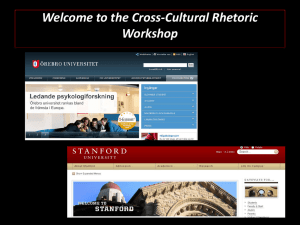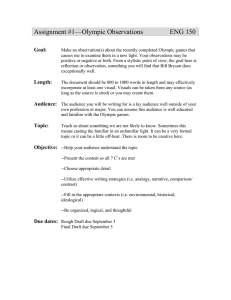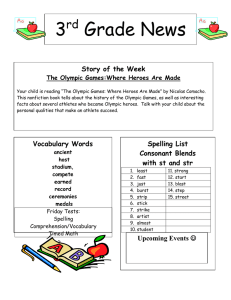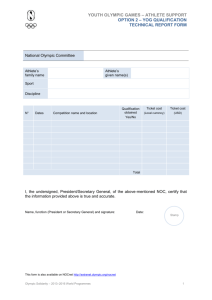Mr. Chairman,
advertisement
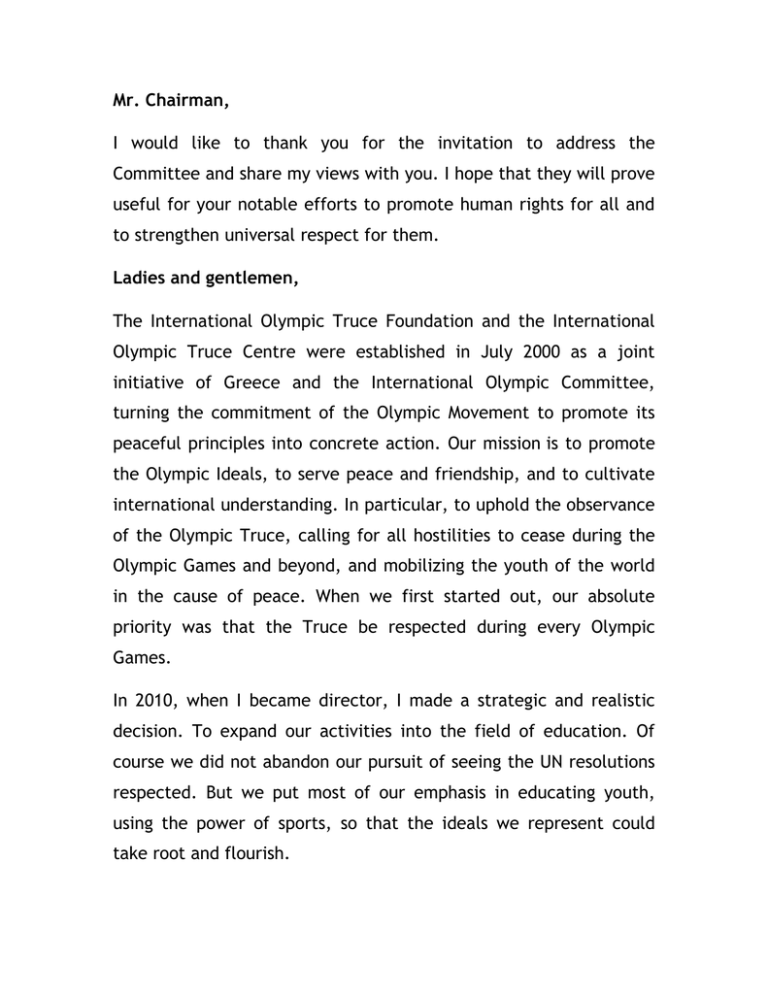
Mr. Chairman, I would like to thank you for the invitation to address the Committee and share my views with you. I hope that they will prove useful for your notable efforts to promote human rights for all and to strengthen universal respect for them. Ladies and gentlemen, The International Olympic Truce Foundation and the International Olympic Truce Centre were established in July 2000 as a joint initiative of Greece and the International Olympic Committee, turning the commitment of the Olympic Movement to promote its peaceful principles into concrete action. Our mission is to promote the Olympic Ideals, to serve peace and friendship, and to cultivate international understanding. In particular, to uphold the observance of the Olympic Truce, calling for all hostilities to cease during the Olympic Games and beyond, and mobilizing the youth of the world in the cause of peace. When we first started out, our absolute priority was that the Truce be respected during every Olympic Games. In 2010, when I became director, I made a strategic and realistic decision. To expand our activities into the field of education. Of course we did not abandon our pursuit of seeing the UN resolutions respected. But we put most of our emphasis in educating youth, using the power of sports, so that the ideals we represent could take root and flourish. We are doing this because we want, through the inspirational power of sports, to use sports as a tool to instill the Olympic values in the young generation, to help them gradually build a Culture of Peace. It is there that the Olympic values meet respect for human rights. The former UN Secretary General Kofi Annan has once said “if we can have peace for 16 days, then maybe, just maybe, we can have it forever”. The Olympic Truce is a precondition for peace. Respect for human rights is a prerequisite for peaceful coexistence. To reach coexistence in harmony, each of us has to develop a Culture of Peace. And still, can anyone be considered an integrated personality who endorses the basic norms of peaceful coexistence without fully accepting, with no hesitation, the principle of human rights? Allow me at this point to quote a personal discussion with an Italian athlete, a woman, who has won many Olympic medals. She told me that she had to reach the age of 30 to realize the “grandeur” of the Olympic Games and, most of all, the values governing the Olympic Games. I am afraid this is a reality for many athletes, who compete without realizing the ideals the Olympic movement stands for, and, as a result, they cannot adopt them. An athlete, as well a citizen, a community member or a fan, cannot be considered a creative personality if he/she has not developed, through education, a detailed view of the value and usefulness of adopting the sports ideals as a way of life, as a perception and approach towards everyday life, towards the problems and the challenges of modern societies. This applies even more to the young generation. This is why we have chosen to be present at the Youth Olympics that will be taking place in Nanjing, China, this summer (16-28 August, 2014). Our workshops and other educational activities will be delivered to the young athletes, aiming not only to teach them the history of Olympic Truce, but also to help them understand and incorporate into their philosophy the values of Olympism and Olympic Truce. Quizzes and puzzle games, delivered on tablet PCs, will help us communicate the eternal messages of the Olympic movement in a way the young generation can appreciate and enjoy. Athletes, especially those competing at a top level, are extremely focused on reaching the top. On the other hand, athletes in the Youth Olympic Games are still children, who are now developing their personalities. We are thus developing special programs for them to help them realize the “grandeur” of the Olympic movement, the values it stands for, most of which are closely interconnected with human rights, and the ways to apply those values not only on the field of competition, but also in their everyday lives. Just before the Youth Olympic Games in Nanjing, we are organising the IMAGINE PEACE Youth Camp, in Ancient Olympia. Participants from all over the world, coming both from underserved communities and post-conflict societies, as well as from developed countries or countries that enjoy long-term peace, are being brought together in a week-long camp, to learn the principles and ideals of Olympism, of Olympic Truce and, thus, of Peace. In fact, a whole day will be dedicated to Human Rights. The camp will further explore equality, social inclusion and conflict resolution. The strengthening of dialogue and cooperation through a mentality linked to Olympism and Sports will be also analyzed. Ladies and Gentlemen, Our wider and long-term objective is to create and gradually promote the adoption of a Culture of Peace that respects human rights. We have therefore developed innovative educational programs that help us reach the young generation, discuss the basic principles of Olympism with them, and educate them in how to endorse the Olympic ideals and respect for human rights. The IMAGINE PEACE Educational program that took place in the school years 2011-12 and 2012-13 reached more than 5,000 students in 50 schools around Greece. The workshop was based on the coloring book “Colours for Peace” and lasted 45 minutes. The instructor used experiential techniques to assist students in participating and learning in practice the history and ideals of Olympism and Olympic Truce. By teaching children the basic Olympic values, we were at the same time familiarizing them with the respect of basic human rights, as the two share a common identity. Our major project underway, is the RESPECTING DIVERSITY Educational program which started this school year and has already reached more than 3,000 students in 90 schools around Greece, while 3 seminars for educators have been organized so far. This workshop is based on the poems found in the RESPECTING DIVERSITY book and addresses the issue of bullying, in all its expressions. We have chosen to point up the issue of bullying because it is one of the most widespread forms of human rights violation among students. We want to educate students in how to respect diversity and how to address such issues when they face them. Experiential techniques are used here as well, but the active participation of teachers is also required! Olympians are an essential part of the program, as role models who can penetrate children's souls in the most effective way and teach them tolerance towards opponents, the joy of participation, teamwork spirit, and above all the spreading sense of equality when Olympic Games take place. In the same direction, we organized a national competition on bullying, which attracted the interest of more than 1,600 students, who under the supervision of 200 teachers, sent their own video presentation on bullying. The next step of this project is the organization of the competition on a European level, so as to reach as many youngsters as possible. The European competition will be developed in cooperation with the European Commission and the Hellenic Ministry of Education. Moreover, we have joined forces with UNICEF to promote the values of peace, tolerance and solidarity, thus sending a strong message against violence and racism. The educational program "You and I, together, for a world of peace, without violence and racism," aims at students in primary and secondary education, aged 6 to 18, and intends to inform and sensitize them on the aforementioned values. The students, under the guidance of their teachers and family, organize a series of activities in and around the school, such as sporting events, theatrical productions, exhibitions, lectures, etc. We also work closely with NOAs and NOCs to “export” our know-how so that they implement our educational programs in their countries. In order to facilitate educators outside Greece, in tandem we either offer a three-day program, in which teachers and educators are familiarized with our educational programs and then teach the model in two afternoon sessions, or provide our online teacher’s guide, giving educators the opportunity to get to know our programs and further elaborate on them. We work with people and we want to create incentives for them to participate actively. We want to involve people and communities in our activities and help them understand that the culture of peace requires active players from all sides. Teaching respect for human rights is one thing. As the IOTC, we strive to respect them in practice. For this reason, we deliver our programs to schools for deaf and blind children and to schools for children with special abilities. Since early 2013, we have initiated our partnership with the SOS Villages in Athens, which serve orphans and abandoned children, providing them with housing and educational opportunities. We participated in a fundraising event for the SOS Children’s Villages. During the event, which attracted more than 1,000 people, including representatives from 37 Embassies, we offered our IMAGINE PEACE Educational Program and we familiarised children of different nationalities and backgrounds with the values of Olympism and Olympic Truce. I referred earlier, when discussing the rationale of the IMAGINE PEACE Youth Camp, to societies at war and post-conflict societies and to countries that enjoy peace. Due to the complexity of the modern world, we have been “forced” to identify two types of societies so that we can adapt our rationale accordingly. Post conflict societies In post-conflict societies, we should put emphasis on healing the wounds of war by offering an alternative way of dealing with opposing interests. We must use sport as an example of a situation in which different personalities compete, but also respect the same rules – and most of all, they respect their opponents. We must teach them that collaborative effort can add up to much better results – and they will need this skill to reconstruct their community. We learn with them how much power sports can have if they become a central activity for a community. To keep young people from following a more violent path in life, we have to: - Offer an alternative life model; a model wherein young people’s natural rebelliousness and energy are channeled elsewhere, into sport and other peaceful activities, to the benefit of the community. Our aim is to identify each young person’s special characteristics and inclinations so that these may by expressed creatively through sport. To help children change their standards – the models according to which they live – you have to impact their existing standards. We have to find the leaders of the community and convince them that they can use their influence for something good. We need to give them incentive to change. They have to be made to understand that, because they are community leaders, they can influence the younger generation through their stance. -And we also have to teach young children to function according to rules and to recognize that they need to respect those rules if they want to participate in the game. Initially, they could participate in the game in an ‘unregulated’ manner (e.g., you give them a ball and tell them they have to score a goal, make a basket, etc.). Due to their circumstances, you are aware that they may argue, come to blows, etc. Gradually, we must introduce rules (The game is played only with the hands/with the feet, within certain boundaries, for a certain length of time. You may not hit opposing players, etc.). This teaches them to discipline themselves and respect the rules of the sport, provided they want to continue to participate. At the same time, they become more open to respecting the rules of the community, because they learn to function within frameworks of rules. We need to create a new culture, and this is a process that takes time and demands persistence, patience and respect for the particularities of each society. It is a gradual process, but one that must succeed. It is based on strengthening the notion of teamwork, on young people learning to work together to achieve a goal, and on the satisfaction each young person feels when victory is achieved. The satisfaction derived from victory gradually builds selfconfidence. Individuals who see that they can achieve their goals, that they are good at something, are filled with courage and continue on that path; the path, in this case, of the peaceful competition provided by sports. Thus, they gradually withdraw from the war-related activities in which they were previously involved. Aspirations of victory in sport absorb more and more of their time and more and more of their thoughts. They concern themselves with preparing for the next match and thus have less time for war. The next step is for them to come to terms with the notion of defeat and, therefore, seek a second chance. Young people need to realize that defeat, too, is part of every game, as is disagreement with one’s opponent. As we said earlier, due to the conflictoriented nature of the society’s previous activities, there is likely to be conflict among the players. But they will gradually start to come to realise that defeat is part of life but still not detrimental. And this is because, in this case, defeat does not mean death. Here, a loss may mean being teased by members of the other team. But they will always have a second or third opportunity to play again, perhaps winning the next time. And to do this they will devote more of their time to preparation, training will become their priority. And as they come to realize that there is always another opportunity available, they are also prepared to give their opponents a second chance. In this way, we broaden participation in the game. We are starting to achieve our initial goal: for sport to become the focal point of the community’s social life. Not as an end in itself, but as a means for pulling the younger generation away from war-related activities; providing these young people with a new outlet and interest. In tandem, sport is being organized on firm foundations in the community, becoming a workshop where the foundations are laid for young people learning to live peacefully and according to rules. On the one hand, we have the advantages offered by sport: outlet for the energy of youth, life training through rules, respect for one’s opponent, tolerance of difference. On the other hand, we have the loss of human life, which, on the community level, may mean a brother, a friend, oneself – we have the nonexistence of the notion of defeat, because defeat is associated with death. Pointing up these differences in practice in a community preparing to emerge from a state of conflict, we present the young with the dilemma and show them the answer. Through sport, the young can discover and develop their talents. And the best of them will distinguish themselves locally, regionally, nationally or even on the international level. They will gain recognition and they will serve as new models for their communities. This will create a process that is self-perpetuating – with sport being the vehicle for the process – resulting in the creation of new models. As the right incentives are established – such as construction of better sport infrastructure for the communities emerging from conflict, leading to the emergence of new models – the majority of the society will support and safeguard this goal. Non post-conflict societies Working with non-post-conflict societies is different because there are other characteristics and challenges to respond to, but one of the main challenges is still to accept and respect the human rights of others and to defend them when needed. Cultural differences are present and are acute. Immigration flows towards Europe and other developed areas are constant and raise concerns among the more conservative groups of our societies, and may eventually lead to racism. Sex discrimination and marginalisation of social groups for cultural reasons also lead to conflict within the society. The first step is to learn to tolerate other people’s special characteristics. Someone can be tall or short, white or black, Asian or South American, gifted or disabled, Muslim or Hindu, conservative or progressive, and so on. Tolerance for diversity is the basis of Enlightenment, the very basis of our society. We need to ensure that everyone has the right to exist and express his/her ideas freely. The next step we need to take is to enhance cross-cultural exchanges and show the young generation that being different does not mean being unequal. By knowing each other’s culture, youngsters are able to de-demonise stereotypes, to shake off prejudice and understand the essence of a culture or an idea. At the same time, they have the opportunity to showcase their own culture, special characteristics and ideas and create the basis for an honest dialogue. Having understood the contribution of tolerance and cross-cultural cooperation to building societies that are more open, the young generation eliminates the causes of conflict. No one fights an idea that is familiar to him or her. He/she may oppose it or try to convince someone else that her own idea is more appropriate but she will do that in a peaceful way. Therefore, we can help the young generation to be builders of peaceful coexistence. When we say that we want global peace, we do not support that a universal truth will prevail. We support that people will argue for their beliefs, being ready to accept that their ideas may be enriched by someone else’s input. Constructive disagreement can prevail through comparison with the consequences of conflict, as described in the previous chapter. When a society is not at war, then there is a more or less structured political system. We do not intervene in the way it operates. We cooperate with the competent authorities, such as the Ministry of Education and/or Ministry of Sports / Culture, local authorities and NGOs, to develop programs that promote our ideals. Societies not at war have other challenges, equally important and crucial. Changing a society’s value system may prove as difficult as reconstructing a post-conflict society. Therefore, we focus our efforts on educating people, and especially the younger generation. We strive to develop innovative programs that will help them respect human rights and teach them how to apply the ideals of peace and Olympism in their everyday lives. We have developed educational projects whose impact we monitor and we follow-up. I referred to them previously: IMAGINE PEACE Youth Camp, IMAGINE PEACE Educational program, RESPECTING DIVERSITY Educational program, YOU AND I, TOGETHER, FOR A WORLD OF PEACE, WITHOUT VIOLENCE AND RACISM – together with UNICEF) Ladies and gentlemen, To achieve our goals, we develop synergies with organizations that share our values. We believe that we can contribute our small part to the tremendous effort that is being made by the UN, the Olympic movement and other international organizations to educate people to respect human rights. Promoting a healthy way of life does not refer just to our bodies. It also refers to our minds and souls. A healthy person is a person in equilibrium, who develops his body and his personality equally. As members of the Olympic movement, we need to inspire people to respect human rights. Sports have an inspirational power for all humanity. We need to exploit this power to instill in people’s minds, especially young people’s minds, the ideals that will help them create and live in a better world. In this respect, the International Olympic Truce Centre is looking forward to your active participation in its activities. Based on your experience and expertise, your contribution would be to participate in a global network through which we will exchange ideas, experiences and know-how with the aim of developing new projects that will promote respect for human rights and the Olympic ideals. Excellence does not apply only to competition. It also applies to social performance, how you act within your community and try to be a useful member of society. And you cannot do that without respecting human rights…. Thank you very much for your attention!
